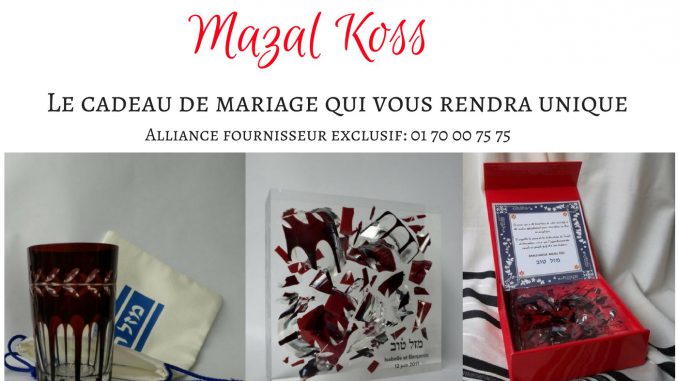
Breaking a glass under the wedding canopy, the wedding canopy, is an inescapable custom of Jewish marriage. But what happens to the shards of the famous glass – koss, in Hebrew – after the ceremony? In most cases, nothing. In Israel as in France, it is rare that they are preserved.
Error! In the Middle Ages, our ancestors used to preserve them and keep them at home for decades. A habit that still prevails today in Italian communities.
With Mazal Koss, you too can save this sign of marital bliss.
In fact, rabbinic commentaries have always emphasized the spiritual importance of the broken koss. The Shulkhan Arukh, a compilation of Jewish laws dating from the 16th century CE, and the Talmud’s Berakhot (“Blessings”) treatise clearly emphasize one point: the custom in question is not only intended, as is often believed, to commemorate at this solemn moment the double destruction of the Temple in Jerusalem.
Our masters teach us that by breaking the glass, the hatan, in other words the fiancé, conjure up the risk of misunderstanding between his family and that of his bride, the kala.
Even more: he prevents the forces of evil from entering his new home, the one where he will settle with his wife and future children. It is a way to warn them:
Eminent rabbis, for two millennia, have therefore recommended to the bride and groom to keep the koss: a lucky charm forever. Curiously, this advice is somewhat or even completely forgotten today – except in Italy, as mentioned above.
In order for D. to protect and bless your couple, the Alliance company has developed a new concept, called Mazal Koss, for young Israelis and French Jews about to be put under the crescent.
A simple but imaginative formula, a wonderful memory, a guarantee of prosperity and longevity according to the Hebrew tradition, finally materialized in the form of a gift that families can give to themselves or that a relative can gratify the hatan and the kala. “A magnificent idea,” says a framework from the Consistoire de Paris.
The process is as follows: before the wedding, you bring a glass that is dear to you because it belonged to a loved one or you opt for a red or blue koss provided by Alliance. One employee – no more kosher! – of the company takes care of picking up the debris, which is locked in a bag when the fiancé breaks the glass with his foot (which allows for full back-up and avoids adding the slightest dust on the floor). After the ceremony, the pieces are delicately placed in a block of transparent resin that solidifies little by little. An artistic operation, technically flawless, performed by a company in the Paris region. A block three to four centimeters thick is thus created.
The names of the bride and groom and the date they said yes religiously are written on the coin – and, if applicable (on the back), the name of the donor. Finally, the Mazal Koss is protected by a superb casket made in Italy which contains a certificate of authenticity guaranteeing that the debris is yours. It is delivered to your home, in Israel or France, within three weeks of the ceremony.
Source: Alliance Mag

Be the first to comment